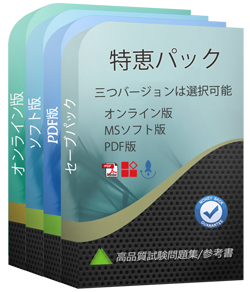BPS-Pharmacotherapy試験学習資料の三つバージョンの便利性
私たちの候補者はほとんどがオフィスワーカーです。あなたはPharmacotherapy (Part1 and Part2) Exam試験の準備にあまり時間がかからないことを理解しています。したがって、異なるバージョンのBPS-Pharmacotherapy試験トピック問題をあなたに提供します。読んで簡単に印刷するには、PDFバージョンを選択して、メモを取るのは簡単です。 もしあなたがPharmacotherapy (Part1 and Part2) Examの真のテスト環境に慣れるには、ソフト(PCテストエンジン)バージョンが最適です。そして最後のバージョン、BPS-Pharmacotherapyテストオンラインエンジンはどの電子機器でも使用でき、ほとんどの機能はソフトバージョンと同じです。Pharmacotherapy (Part1 and Part2) Exam試験勉強練習の3つのバージョンの柔軟性と機動性により、いつでもどこでも候補者が学習できます。私たちの候補者にとって選択は自由でそれは時間のロースを減少します。
信頼できるアフターサービス
私たちのBPS-Pharmacotherapy試験学習資料で試験準備は簡単ですが、使用中に問題が発生する可能性があります。BPS-Pharmacotherapy pdf版問題集に関する問題がある場合は、私たちに電子メールを送って、私たちの助けを求めることができます。たあなたが新旧の顧客であっても、私たちはできるだけ早くお客様のお手伝いをさせて頂きます。候補者がPharmacotherapy (Part1 and Part2) Exam試験に合格する手助けをしている私たちのコミットメントは、当業界において大きな名声を獲得しています。一週24時間のサービスは弊社の態度を示しています。私たちは候補者の利益を考慮し、我々のBPS-Pharmacotherapy有用テスト参考書はあなたのBPS-Pharmacotherapy試験合格に最良の方法であることを保証します。
要するに、プロのBPS-Pharmacotherapy試験認定はあなた自身を計る最も効率的な方法であり、企業は教育の背景だけでなく、あなたの職業スキルによって従業員を採用することを指摘すると思います。世界中の技術革新によって、あなたをより強くする重要な方法はPharmacotherapy (Part1 and Part2) Exam試験認定を受けることです。だから、私たちの信頼できる高品質のBoard of Pharmacy Specialties有効練習問題集を選ぶと、BPS-Pharmacotherapy試験に合格し、より明るい未来を受け入れるのを助けます。
現代IT業界の急速な発展、より多くの労働者、卒業生やIT専攻の他の人々は、昇進や高給などのチャンスを増やすために、プロのBPS-Pharmacotherapy試験認定を受ける必要があります。 試験に合格させる高品質のPharmacotherapy (Part1 and Part2) Exam試験模擬pdf版があなたにとって最良の選択です。私たちのPharmacotherapy (Part1 and Part2) Examテストトピック試験では、あなたは簡単にBPS-Pharmacotherapy試験に合格し、私たちのPharmacotherapy (Part1 and Part2) Exam試験資料から多くのメリットを享受します。
本当質問と回答の練習モード
現代技術のおかげで、オンラインで学ぶことで人々はより広い範囲の知識(BPS-Pharmacotherapy有効な練習問題集)を知られるように、人々は電子機器の利便性に慣れてきました。このため、私たちはあなたの記憶能力を効果的かつ適切に高めるという目標をどのように達成するかに焦点を当てます。したがって、Board of Pharmacy Specialties BPS-Pharmacotherapy練習問題と答えが最も効果的です。あなたはこのPharmacotherapy (Part1 and Part2) Exam有用な試験参考書でコア知識を覚えていて、練習中にPharmacotherapy (Part1 and Part2) Exam試験の内容も熟知されます。これは時間を節約し、効率的です。
BPS Pharmacotherapy (Part1 and Part2) 認定 BPS-Pharmacotherapy 試験問題:
1. Many clinically important adverse drug reactions (ADRs) are detected after the marketing of a drug, rather than during premarketing clinical trials. Of the following, which is the primary reason for this phenomenon?
A) Adverse reactions that are due to drug interactions or drug accumulation in renal insufficiency cannot be studied prospectively during the premarketing phase of clinical evaluation.
B) Pharmaceutical companies prefer to market agents with favorable side-effect profiles, so they focus premarketing studies on efficacy rather than on ADRs.
C) Too few patients are studied for too short a period of time during premarketing clinical trials.
D) Premarketing studies focus on efficacy rather than on safety; therefore, the study design accounts for the failure to detect ADRs.
2. Which of the following is an example of a sentinel event, as defined by the Joint Commission?
A) Administration of digoxin to the Wrong patient without adverse events
B) Death due to overdose of methylphenidate obtained from a brother's prescription
C) Removal of the Wrong breast during surgery
D) Death due to heart failure following discharge against medical advice
3. Which statement best describes current recommendations on postnatal corticosteroids in neonatal Broncho pulmonary dysplasia?
A) High-dose dexamethasone is routinely and strongly recommended.
B) Late and long-term hydrocortisone therapy may be warranted.
C) Early, low-dose, short-course hydrocortisone therapy may be beneficial.
D) Combination of dexamethasone and hydrocortisone long-term therapies is advised.
4. Interpretation of the findings of a research project should be placed in which section of an abstract?
A) Conclusion
B) Background
C) Results
D) Methods
5. From ethical and scientific validity standpoints, in addition to double blinding, which of the following research designs is best for determining a new medication's relative efficacy in treating acute stroke?
A) Parallel design comparing the new therapy with the best standard therapy
B) Placebo-controlled, randomized, parallel design
C) Crossover design comparing the new therapy with the best standard therapy
D) Placebo-controlled, crossover design
質問と回答:
| 質問 # 1 正解: C | 質問 # 2 正解: A | 質問 # 3 正解: C | 質問 # 4 正解: C | 質問 # 5 正解: C |


 弊社は製品に自信を持っており、面倒な製品を提供していません。
弊社は製品に自信を持っており、面倒な製品を提供していません。



 植木**
植木**

